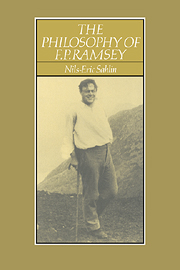Book contents
- Frontmatter
- Contents
- Preface
- Acknowledgements
- INTRODUCTION
- Chapter 1 PHILOSOPHY OF PROBABILITY
- Chapter 2 BELIEF AND TRUTH
- Chapter 3 KNOWLEDGE
- Chapter 4 GENERAL PROPOSITIONS AND CAUSALITY
- Chapter 5 PHILOSOPHY OF SCIENCE
- Chapter 6 LOGIC AND MATHEMATICS
- Chapter 7 RAMSEY'S THEOREM
- Chapter 8 UNIVERSALS
- Chapter 9 ECONOMICS
- Chapter 10 BIOGRAPHICAL GLIMPSES
- Notes
- Bibliography of F. P. Ramsey's works
- Index of names
Chapter 5 - PHILOSOPHY OF SCIENCE
Published online by Cambridge University Press: 18 September 2009
- Frontmatter
- Contents
- Preface
- Acknowledgements
- INTRODUCTION
- Chapter 1 PHILOSOPHY OF PROBABILITY
- Chapter 2 BELIEF AND TRUTH
- Chapter 3 KNOWLEDGE
- Chapter 4 GENERAL PROPOSITIONS AND CAUSALITY
- Chapter 5 PHILOSOPHY OF SCIENCE
- Chapter 6 LOGIC AND MATHEMATICS
- Chapter 7 RAMSEY'S THEOREM
- Chapter 8 UNIVERSALS
- Chapter 9 ECONOMICS
- Chapter 10 BIOGRAPHICAL GLIMPSES
- Notes
- Bibliography of F. P. Ramsey's works
- Index of names
Summary
It is probably no exaggeration to say that at the turn of this century we knew in broad outline as much about the philosophical foundations of science as we know today. The contribution of this century, as far as it goes, seems to be the formalisation of what was common knowledge among philosophers and historians of science some hundred years ago. The question thus remains to be answered if more or less heavy logic really has taught us anything of value.
The latter half of the nineteenth century offers up a mine of information for anyone who wants to see how a scientific era comes to an end and is replaced by a totally new way of thinking about the world. A deterministic view of physics and the world was no longer fruitful. Maxwell's electromagnetic theories could not, for example, be formulated within a mechanistic or deterministic conceptual framework. One of the physicists and philosophers who was influential at this time, and whose Die Analyse der Empfindungen may have had an unforeseen influence on Ramsey, was Ernst Mach. Taking what Nagel calls a descriptive view of science, Mach strongly argued against so-called theoretical terms, that is, against entities like ‘electron’, ‘gene’, ‘risk-aversive’ and ‘introvert’. In his view such entities are justified only if they help us in systematising the empirical observations we have made. If not, they must be considered metaphysical terms and should be banished from science.
- Type
- Chapter
- Information
- The Philosophy of F. P. Ramsey , pp. 125 - 158Publisher: Cambridge University PressPrint publication year: 1990



